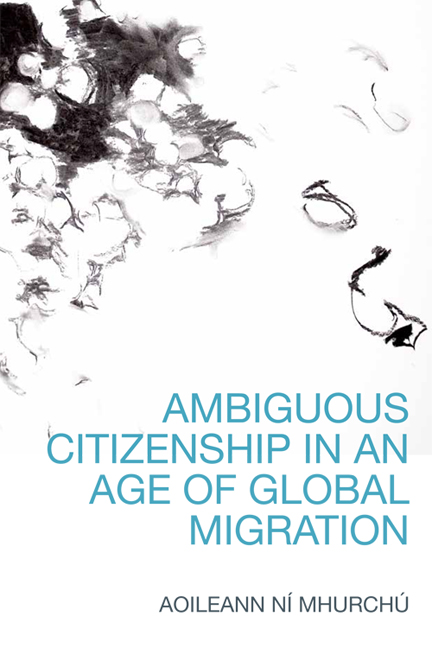Book contents
- Frontmatter
- Contents
- Acknowledgements
- Abbreviations
- Translations
- Introduction
- 1 Exploring the Citizenship Debate: The Sovereign Citizen-Subject
- 2 A Lens: The 2004 Irish Citizenship Referendum
- 3 Trapped in the Citizenship Debate: Sovereign Time and Space
- 4 Interrogating Sovereign Politics: An Alternative Citizen-Subject
- 5 Challenging the Citizenship Debate: Beyond State Sovereign Time and Space
- 6 Traces Rather than Spaces of Citizenship: Retheorising the Politics of Citizenship
- Conclusion
- Bibliography
- Index
Introduction
- Frontmatter
- Contents
- Acknowledgements
- Abbreviations
- Translations
- Introduction
- 1 Exploring the Citizenship Debate: The Sovereign Citizen-Subject
- 2 A Lens: The 2004 Irish Citizenship Referendum
- 3 Trapped in the Citizenship Debate: Sovereign Time and Space
- 4 Interrogating Sovereign Politics: An Alternative Citizen-Subject
- 5 Challenging the Citizenship Debate: Beyond State Sovereign Time and Space
- 6 Traces Rather than Spaces of Citizenship: Retheorising the Politics of Citizenship
- Conclusion
- Bibliography
- Index
Summary
In migration contexts, citizenship marks a distinction between members and outsiders based on their different relations to particular states.
Rainer BauböckCitizenship is cast as the state's revenge [in] the functioning of the migration law–citizenship law dichotomy … Citizenship law … becomes a site to observe a sharp illustration of globalization's paradoxical nature: both inclusions and exclusions are multiplied here.
Catherine DauvergneThe relationship between citizenship and migration is usually seen in terms of sharp distinctions between insiders and outsiders. As Baubock and Dauvergne show, statist perspectives continue to dominate when thinking and talking about citizenship, even in a recognised postmodern world. This book is an empirically informed theoretical critique of the assumption underpinning such scholarship; namely that we must continue to understand the politics of citizenship in terms of sovereign presenting subjects who can always be defined vis-á-vis their relationship with the state – as included or excluded from it. It seeks instead to highlight the challenges which migration poses to the notion that we can continue to think about subjectivity unproblematically in terms of such a statist (and therefore a modern) framework. This book asks whether the emphasis on mobility and fluidity which migration assumes – which is now a more general feature of a globalised world – does not undermine precisely this idea of a sovereign and autonomous subject which is connected to, but ultimately separate from, political community. Can we really continue to make sense of political subjectivity in terms of the sovereign state and the idea of continuing (if blurred) distinctions between inclusion and exclusion, particularism and universalism, inside and outside? Or, is it not precisely this dualistic framework which needs to be rethought?
Citizenship is understood here as a category which is linked to, but cannot be reduced to, an idealised inclusive status. It is explored instead as a category which is inseparable from questions about ‘foreignness’, ‘strangerhood’ and ‘otherness’ and from experiences through which people participate as members of a political community despite not always being recognised as full members of that community.
- Type
- Chapter
- Information
- Ambiguous Citizenship in an Age of Global Migration , pp. 1 - 26Publisher: Edinburgh University PressPrint publication year: 2014



